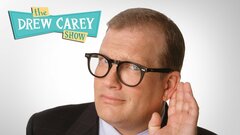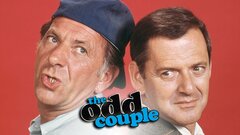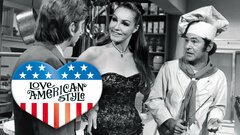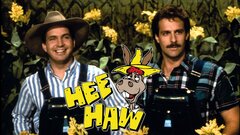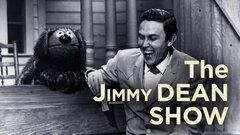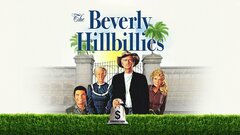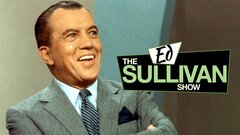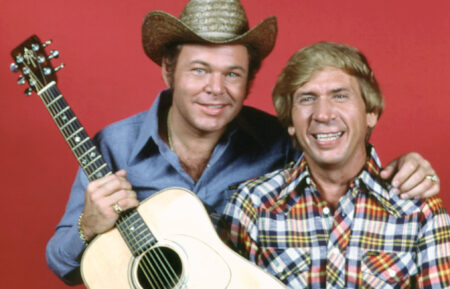For much of the 1970s, entertainer Roy Clark was one of the most ubiquitous figures in country music, appearing weekly on television as the co-host of the long-running variety show "Hee Haw" (CBS, 1969-1994) and various other programs while maintaining a successful career as a recording artist with a slew of Top Ten singles during the decade. His capacity for broad, cornpone humor occasionally obscured his astonishing talent on a variety of instruments, including banjo, guitar and mandolin, which earned him numerous music awards throughout his career.
Clark's fame during the 1970s also allowed him to briefly flirt with acting in features, though music would remain his most successful showcase, even after the hits dwindled in the early 1980s. Despite this setback, he remained an extremely popular concert draw for the next three decades while continuing to record for minor labels. Throughout his half-century in music, Roy Clark's limitless talents and personable nature underscored his status as one of the most admired figures in country music.
Born Roy Linwood Clark in Meherrin, VA on April 15, 1933, he was the son of amateur musicians who raised him in Staten Island, NY and later Washington, D.C. An extraordinarily gifted musician from an early age, he began playing guitar, mandolin and banjo as a youngster, eventually becoming proficient enough to not only back his father at local dances but capture two National Banjo Championship titles. Despite this exceptional success, Clark was focused on a career in sports, initially as a baseball player before switching to boxing. His stint in this field was short-lived, and by the age of 17, he was performing regularly in clubs and on radio and television.
For a period of time, Clark backed Jimmy Dean on his Washington, D.C.-based television series "Country Style" (WTOP-TV/CBS, 1957) before heading west to perform with bandleader Hank Penny in Las Vegas. Clark next led rockabilly queen Wanda Jackson's band, providing blistering guitar leads in concert and on singles like "Let's Have a Party." When Jackson retired that particular incarnation of her backing group, Clark signed with her former manager, Jim Halsey, who groomed him as an all-purpose entertainer. He signed with Capitol Records in 1963, scoring a Top Ten single on the country chart that same year with the Bill Anderson song "Tips of My Fingers."
His affable personality and knack for gentle comedy, combined with his impeccable musical skills, also made him a favored guest on variety series, as well as an occasional acting gig, most notably on "The Beverly Hillbillies" (CBS, 1962-1971) as the Clampett's cousin Roy. Clark also showed his willingness to perform broad comedy by donning drag to play Roy's mother in a 1968 episode. That same year, Clark left Capitol for Dot Records, where he enjoyed considerable chart success with pop-friendly singles, including a cover of French crooner Charles Aznavour's "Yesterday, When I Was Young," which rose to No. 9 on the Billboard singles chart in 1969.
But his true breakthrough career move was as co-host of "Hee Haw" (CBS/syndicated, 1969-1992), a sort of country music take on "Rowan & Martin's Laugh-In" (NBC, 1968-1973) that featured broad comedy interspersed with guest performances by some of the biggest names in the genre. Clark not only served as co-host with singer-songwriter Buck Owens, but also participated in numerous recurring sketches while also sitting in with the Million Dollar Band, a regular jam session segment that also featured such legendary Nashville players as Chet Atkins, Floyd Cramer and Charlie McCoy.
Though Owens would later turn his back on the series, which he claimed undermined his status as a serious performer, Clark would ride its wave of popularity to widespread fame in the 1970s. He scored a string of hits throughout the decade, including Top Ten singles like "Thank God and Greyhound," "Come Live With Me," and "If I Had To Do It All Over Again," while maintaining a staggering schedule of television appearances and concerts, often with musicians from other genres like bluesman Clarence "Gatemouth" Brown.
He became the first country star to serve as guest host of "The Tonight Show Starring Johnny Carson" (NBC, 1962-1994), and expanded his acting appearances to include a few films, though most hewed along the lines of low-budget material like "Matilda" (1978), a hapless comedy about a boxing kangaroo. From 1977 to 1980, the Country Music Association named him Instrumentalist of the Year. Clark's recording career began to wane in the late 1970s following his departure from Dot for MCA. Though he captured a Grammy for a 1982 instrumental performance of "Alabama Jubilee," the hits grew further and further apart as he bounced from label to label.
Clark shrewdly combated the decline of his star-standing by investing wisely in real estate, publishing and minor-league baseball teams, all of which made him a very wealthy man. He also was the first country music star to open his own theater in the town of Branson, MO, which soon after blossomed into an entertainment oasis for fellow country stars and fans. The Roy Clark Celebrity Theater, which opened in 1983, attracted top talent to the region, who soon followed suit by opening their own venues.
The success of the theater preserved Clark's status as one of country music's biggest stars, a status which was enshrined by his induction into the Grand Ole Opry. He continued to record throughout the 1990s and 2000s, sticking closely to new versions of his established hits on largely ignored releases, though 1994's Roy Clark and Joe Pass Play Hank Williams, which teamed Clark with his jazz guitar idol, drew positive reviews.
Clark was inducted into the Country Music Hall of Fame in 2009 and was honored by the Oklahoma House of Representatives in 2011. Roy Clark died on November 15, 2018 at the age of 85.
By Paul Gaita







